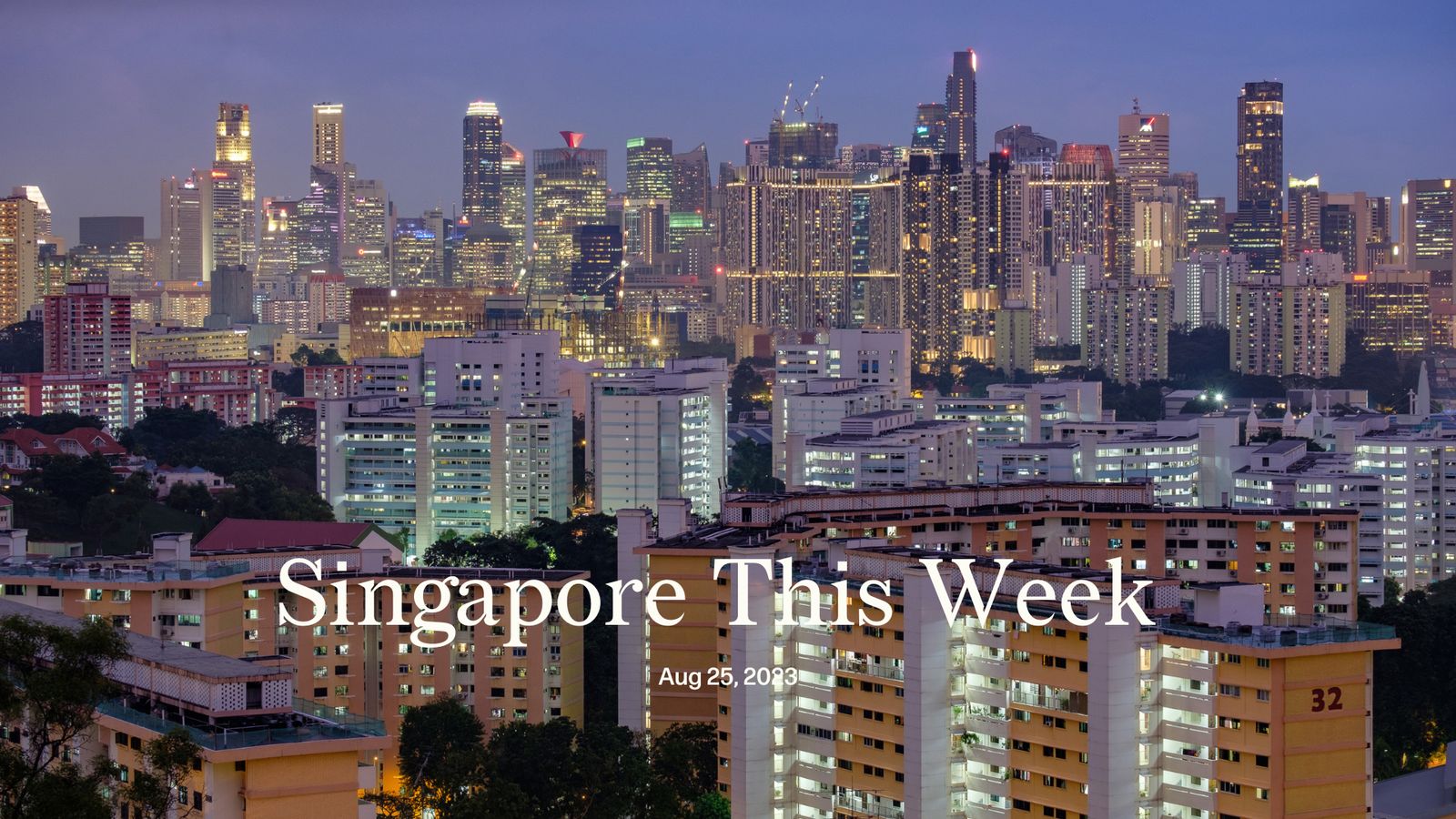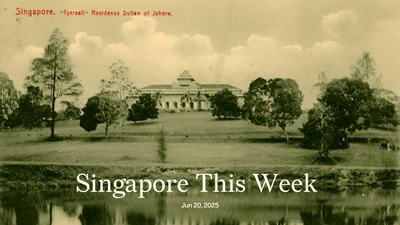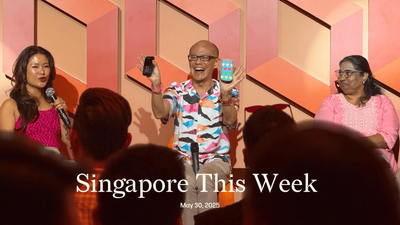Politics: Tan Kin Lian’s troubling history of racist and sexist posts
On November 23rd 2021, 75-year-old Tan Kin Lian, a former CEO of NTUC Income and presidential candidate in 2011, posted a series of photos of “pretty girls” on a 4.17km walk. One photograph is a close-up of a woman’s bum exposed below her ripped denim shorts. One of his “Top fans” commented “Food eaten too good.” A follower responded with a “I like big butts and I cannot lie” GIF. Alongside his popular “pretty girls” series is a racist post from 2015. “I boarded SMRT 857 and found that I was in Mumbai. Hahaha,” he said. He took it down and apologised only to “local Indian friends who feel offended”, and not “...foreigners (who think they now own Singapore).” This is the misogynistic and racist clown show that now has a second chance to occupy Singapore’s Istana. Tan is one of three candidates, along with Ng Kok Song and Tharman Shanmugaratnam, in next Friday’s presidential election. But how did Tan even meet the stringent qualifying criteria? (See Jom’s explainer on it.) Many, including the Association of Women for Action and Research (AWARE), have since questioned the work of the Presidential Elections Committee (PEC), which has broad discretion over whom to qualify. Last Friday, the PEC said that Tan is a “man of integrity, good character and reputation”. The PEC’s unsatisfactory response to the current furore is that it did not assess Tan’s social media posts before passing him, and is now legally bound to its decision. (The PEC previously passed him for the 2011 election, but that was before all these posts.) Tan, who has a history of regularly banning critics from his pages, claimed there was an orchestrated campaign, involving AWARE and a “top opponent” [Tharman] to smear him, and then later admitted he had no evidence. His daughter came out in his defence. He now claims to “have great respect for Indians”. Notwithstanding the obvious differences between countries and offices, the parallels to Trumpian behaviour and rhetoric are clear. Voters were backing Tan because of his perceived independence from the state, particularly compared to Tharman and Ng. Some will now spoil their vote. If his fans, including those who like his straight-talking style, carry him to office, people may be emboldened to indulge in bigoted speech. Moreover, imagine a president going on walks with his camera, all around the world, taking photographs of women’s body parts for his followers, and then insisting he’s not objectifying them. Perhaps this is the absurdity Singapore deserves for having created a highly-problematic office.
Society: Housing a hot topic at the National Day Rally
Public housing policy tweaks announced by Lee Hsien Loong, the prime minister, reflect the government’s attempt to address two of its perennial problems: the exclusion of singles from swathes of the market and asset speculation, given relatively low direct purchase prices alongside a red-hot resale market. In 1988, S Dhanabalan, then national development minister, said that land-scarce Singapore couldn’t allow every single person to have their own flat. Doing so would also conflict with the state’s focus on the traditional family unit, he added. But as societal expectations and demands evolved, the government’s attitude towards single home ownership has had to change so as to remain relevant to a new voter demographic. In 1991, the resale market was opened to singles aged 35 and above, limited to three-room units at selected locations. Since then restrictions have been gradually eased, but at a pitifully slow pace. One milestone was in 2020, when the government finally allowed unwed Singaporean single parents aged 21 and above to buy a new two- or three-room flat from the Housing Development Board (HDB) in non-mature estates. The new changes mean that from the second half of 2024, eligible singles will be able to purchase two-room flexi build-to-order (BTO) flats in every location directly from HDB, giving them access to all BTO projects. Still there’ll be those who had hoped for a drop in the age limit and access to larger BTO flats. And let’s not forget queer couples, a group still excluded from public housing policies. Housing estates are also being reclassified from mature/non-mature to Standard, Plus and Prime (depending on desirability of location). PropNex says this greater “product segmentation” reflects the increasing diversity of neighbourhoods in terms of amenities and location. Stricter rules for Plus and Prime properties, including a 10-year minimum occupation period and income ceilings for resale buyers, could ease the “lottery effect”, said analysts, and temper resale prices from 2035 onwards—though demand could spillover into other segments. The elderly will also benefit from “enhancements to the current Enhancement for Active Seniors (EASE)” programme, including foldable shower seats and wider toilet entrances for wheelchair-bound people. While all this is somewhat refreshing, many fundamental problems with the market remain, according to Ku Swee Yong, a real estate consultant. There are “400,000+ ageing HDB flats (over 40 years’ age) coupled with the ageing demographics of Singapore residents”, he told Jom. “We are none the wiser about how the issue of ‘ageing residents in ageing depreciating flats’ may be dealt with.”
Society: Gender neutral toilet creates a big hoo-ha
After a picture of a gender neutral toilet in Suntec Convention Centre was posted on social media last week, positive sentiment towards the mall dropped from 57.8 percent to 22.7 percent. According to media intelligence firm CARMA, keywords associated with Suntec prior to the photo included “business”, “atmosphere” and “McDonald’s”. After the photo: “gender”, “pee” and “shocking”. The single, temporary gender neutral toilet was set up at the request of Wikimania 2023’s organisers (Jom wrote about the event last week), alongside other inclusive measures, such as a quiet room, designated staff to aid participants, and scent-free rooms to accommodate individuals with fragrance sensitivities. “Suntec going woke, gg (good game) for share price soon”, an astute Hardware Zone user predicted. On Facebook, a group called “We are against PinkDot in Singapore” is calling for a boycott of Suntec. But other users were quick to point out the irrational nature of their anger: “Ermmm sometimes when u go some bars or restaurants they are also gender neutral. Why the big Hoo ha[?]” Unfortunately for conservatives, gender neutral toilets are already everywhere: porta-potties, handicap toilets, toilets on planes, in homes etc. These toilets serve as an important inclusive space not only for the LGBTQ community, but for the elderly and their caretakers, parents with young children, wheelchair users and more. Globally, campaigns for gender neutral toilets have gained momentum in recent years, including in countries like China, Thailand and the USA. In 2014, Vancouver, Canada became the first municipality to impose compulsory requirements on all public buildings to install gender neutral toilets. In response to the Suntec controversy, PinkDot addressed the unfounded fear that gender neutral toilets are going to take over traditional gender-segregated toilets; “Phasing out traditional washrooms shouldn’t be the goal here…What we should be asking is: How can we ensure everyone has access to a comfortable, safe and inclusive environment for something as fundamental as using the bathroom?”
History weekly by Faris Joraimi
With Madam Halimah Yacob due to vacate the presidential office, I want to revisit the controversy surrounding her racial identity. At the 2017 Hong Lim Park “silent sit-in” organised by activist Gilbert Goh to protest Halimah’s walkover—my first act of civil disobedience—I held up a sign to express my anger at the racialisation of the presidency. But as I soon realised, my gripe was unlike that of the middle-aged Chinese “unker” demographic who formed a visible majority that day. Many of them felt that ‘meritocracy’ was being undermined. But for Malays, did it ever exist? At the assembly, someone wrote in red ink on a banner: “THIS IS NOT A ‘M’ COUNTRY”, channelling fears of Malay communal domination (really, in Singapore?). But I saw more serious damage: the opportunistic exploitation of the Malay community’s lasting grievances—about being marginalised under structural racism—to serve the PAP’s politically-expedient reshaping of the presidency. I’m not sure who the government consulted to form their conclusion that Malays had been clamouring for presidential representation. We’ve called out discrimination in the military and in a job market that prioritises Mandarin-speakers, as well as the enduring rhetoric about Malays’ cultural and genetic inferiority. Instead of addressing those, the government gave us a largely ceremonial role and congratulated themselves for upholding racial equality. Worse, after reserving the office for one “race”, they had to specify who fit its definition, absurd considering how historically fluid, expansive and even contradictory Malay identity has been. A committee was formed to decide this, sparking meek debate about race as an “evolving concept”. On display were the most abhorrent features of racial governance recalling British times, including arbitrary quotas and classification. Frustratingly, popular backlash reinforced colonial ideas about racial purity: many netizens and sit-in participants (whom I spoke to) thought Halimah having an Indian father disqualified her as a ‘real’ Malay. But when you look at the long history of diverse intermarriages and cultural adoption in Malay society, Halimah’s mixed parentage actually makes her very Malay, not less. (The other aspiring candidates, Mohamed Salleh Marican and Farid Khan, also had South Asian ancestry.) I’m not defending Halimah. But the process that brought her to office showed that we’re not far from the colonials in how we think about race and manipulate it for political benefit. Not to mention the historical illiteracy, of both Party and People, surrounding a concept as old and complicated as Malayness.
Arts: Seven Sacks of Rice
Journalist Nicholas Yong has just published Seven Sacks of Rice and Other Baggage, a new collection of short stories inspired by real events, urban legends, and folk tales. This is Yong’s third book of fiction. He previously published Track Faults and Other Glitches and Land of the Meat Munchers, both with his current publisher Marshall Cavendish. Yong is currently a journalist with the BBC and is part of a growing cohort of ex-mainstream media journalists who now cover Singapore from an international vantage point. The book’s launch will be held at Book Bar, a new bookstore and café with a focus on local and Asian books. It opened only last month and has wasted no time in holding author events. It recently hosted a pre-National Day poetry reading and an afternoon with novelist Rachel Heng, as part of her book tour’s Singapore leg. Book Bar’s entry to the scene is very welcome given how a number of physical bookstores—like BooksActually, The Moon and Huggs-Epigram Coffee Bookshop—have folded in recent years. The launch event for Seven Sacks of Rice and Other Baggage is this Sunday, August 27th, at 3pm. It will be moderated by JP Ong, CNBC’s reporter for South-east Asia.
Arts: Future leaders of the arts
The National Arts Council (NAC) recently announced its 2023 Arts Scholarship recipients. They include two associate artists with Checkpoint Theatre, Lucas Ho and Muhammad Adib Bin Kosnan Siran, the founder of NFT Asia, Jonathan Liu, and deaf performing artist Muhammad Ammar Nasrulhaq (who’ll will be pursuing a Bachelor of Arts Performance in British Sign Language and English at the Royal Conservatoire of Scotland). The NAC scholarships are awarded annually and support “future leaders of the arts and culture sector”, as they undertake full-time degree programmes both locally and abroad. Upon graduation, recipients are required to take up employment at a local cultural institution, or engage with the local art scene in a way that is relevant to their course of study. The scholarship covers “up to 90 percent” of tuition costs and compulsory fees and has a funding cap of S$200,000. This makes it less generous than other merit-based public sector scholarships that generally cover all associated costs with no explicit upper limit. The British High Commission also announced its recipients for this year’s Chevening Scholarships, this month. Among them is Shaza Ishak, the executive and artistic director of Teater Ekamatra, who will be reading an MA in Race, Media, and Social Justice at Goldsmiths, University of London while working full-time at Ekamatra remotely. Chevening Scholarships are awarded to “outstanding emerging leaders” from outside of the UK. The scholarship fully funds single-year master’s degrees in the UK, and carries no bond apart from requiring graduates to return to their country of citizenship for at least two years so they can “contribute to positive change”. Notable Chevening alumni from Singapore include leader of the opposition Pritam Singh, independent journalist Kirsten Han, and Nazry Bahrawi, assistant professor of South-east Asian literature and culture at the University of Washington.
Business: The Guru bites the bullet amidst slowing growth
In a strategic move aimed at consolidating its core business, NASDAQ-listed PropertyGuru, which has 3.5m real estate listings reaching over 40m users monthly, has shut down Rumah, an online property portal in Indonesia, and FastKey, a SaaS product operating across various markets. Rumah, despite being the second-largest proptech platform in Indonesia in terms of traffic and user engagement, will end operations by November 30th. The decision, affecting 61 employees, is expected to come with support mechanisms and compensation packages. FastKey, which serves as a link between agents and over 500 developer projects across South-east Asia, will cease operations staggered over time. Operations will conclude first in Indonesia by July 31st, 2024, followed by closures in Malaysia and Singapore by October 15th, 2024. These decisions are shaped by PropertyGuru’s preference for focusing on scalable main businesses. The company, founded in 2007, reported a 16 percent year-on-year revenue increase in Q1 2023, the lowest since Q1 2022. Hari Krishnan, CEO and managing director, said that these changes will not adversely affect the company’s full-year 2023 financial forecast, and are vital for its next growth phase.
Tech: Injecting capital into the biomedical sector
co11ab Novena, a Singapore-based biomedtech incubator, formally inaugurated its physical facility at Nanyang Technological University (NTU). The state-of-the-art facility, constructed with an investment of around US$11 million (S$14.9m), is a collaborative effort between NTU, the National Healthcare Group, and the Agency for Science, Technology, and Research (A*STAR). One of the seven start-ups nurtured by co11ab, RNAscence Biotech, has developed Renectin Antiscar, an RNA-based patch notable for reducing scar volume by 84 percent in post-surgical trials. This illustrates the type of innovative biomedical solutions that co11ab aims to foster. In an effort to aid start-ups in their development and commercialisation, co11ab plans on seeking partners such as Coronet Ventures, the innovation-facilitating arm of the US hospital operator, Cedars-Sinai Medical Center. Coronet Ventures intends to invest in 12 to 15 promising early-stage biomedical and healthcare start-ups based in Singapore, over the next five years. Their considerable funding range, from US$100,000 (S$135,000) to US$3m (S$4.1m), can facilitate innovation at varying start-ups. Singapore declared the biomedical sciences industry a “fourth pillar” of the economy in 2000, with maverick senior civil servant Philip Yeo leading the charge for it. In 2018, it contributed S$26bn in manufacturing output, or four percent of Singapore’s gross domestic product. Yet amid persistent talent shortages, analysts still bemoan the lack of a big success story. Given the broader pessimism with the fundraising climate, coupled with the capital intensive nature of the biomedical industry, firms like Temasek-backed Tessa Therapeutics have wound down in recent months. Still, the launch of co11ab is an encouraging sign for the sector.
If you enjoy Jom’s work, do get a paid subscription today to support independent journalism in Singapore.








